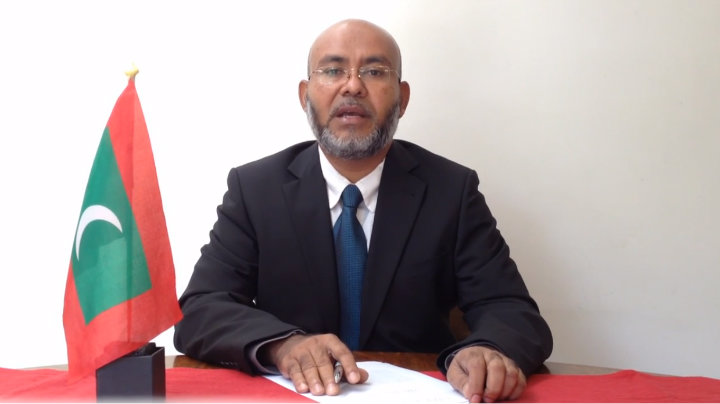On 7 February 2012, somebody in the Indian High Commission – located barely a few meters away from the scene where mutinying cops brought down the first elected government in Maldivian history – gave some astoundingly poor advice to somebody in New Delhi, and what followed was one of the worst diplomatic blunders by India in recent memory.
The tear gas clouds had barely settled when Indian Prime Minister Dr Manmohan Singh sent his ‘warm felicitations’ and became the first country to recognise Vice President Mohamed Waheed’s newly installed government – a coalition of radical Islamists and far right nationalists led by former dictator Maumoon Abdul Gayoom’s party.
The United States and other Western powers would follow India’s lead in recognising the new regime, and – even as Maldivian democrats watched in disbelief – a major wrong that should have been straightened out was instead set firmly crooked.
The next day, the regime police continued targeted attacks on MDP leaders and activists. MPs were beaten half to death and lay unconscious on the pavements. Mohamed Nasheed, the first elected President of the Republic, was roughed up on the streets by uniformed men and was seen bleeding from the forehead. Scores of civilians were publicly brutalised and hundreds of pro-democracy demonstrators were arrested while India naively pursued relations with the new regime.
Over one year later, the cycle of violence and unrest continues on the streets of Male’, as pro-democracy protesters clash with regime police. The latest confrontations started after President Nasheed, in a dramatic turn of events last Thursday, sought refuge inside the Indian High Commission following the Waheed regime’s renewed efforts to arrest him and convict him in what is essentially a kangaroo court.
Once again, all eyes are on India, keenly observing if there will be a repeat of the ghastly diplomatic miscalculations of last year.
A series of unfortunate decisions
The gamble in 2012 was this: in return for the recognition of his regime, Waheed had pledged to honour major Indian investments in the Maldives, including the $500 million investment by Indian infrastructure company GMR in the country’s main international airport. As senior Indian diplomat G Parthasarathy confirmed in a recent televised debate, India had also been given assurances that there would be inclusive, free and fair elections.
Once again, somebody in India’s MEA should have easily flagged that Waheed, being a political nonentity, could hardly be held to his word. As the tinpot leader of a party whose very existence – with merely 3000 odd members – is an exercise in vanity, Waheed hasn’t a prayer of being nominated, much less winning an election, and is destined to be discarded into political oblivion before the end of this year.
And yet, India went with his assurances even as the the regime’s extremist allies took out motorcades around the streets of the capital, demanding GMR’s exit and, for the first time in recent Maldivian history, spreading radical anti-Indian propaganda over loud megaphones.
Sure enough, with the same belligerence and arrogance that characterised their early diatribes against the CMAG and EU, the regime thumbed their nose at India, and the GMR deal was scrapped without the slightest courtesy and amid a barrage of heavy anti-Indian rhetoric propagated by radical regime allies like the DQP and the Adhaalath Party.
India’s big gamble failed, and the aspiring superpower was left with egg on its face as Waheed’s spokesperson Abbas Adil Riza publicly slandered the Indian ambassador, calling him a ‘traitor’ and an ‘enemy of the Maldives’. Furthermore, the regime that was legitimised with Indian support would proceed to cozy up to rival power China, with regime actors going so far as to lambast India while on Chinese soil.
Eliminating Nasheed
In the bargain, India also lost favour with former ally Nasheed – whose government had gone out of its way to align with them. From plugging the Maldives into the Indian coastal security grid, to seeking Indian investments in his much celebrated environmental, energy and infrastructure projects, to unilaterally sharing intelligence on religious radicals operating in the country, Nasheed was thoroughly a friend of India in every imaginable sense until India, with remarkable urgency, dumped him and rushed to Waheed’s aid in 2012.
Having scrapped the GMR deal in an ugly fashion, the Waheed regime also backtracked on the second assurance of conducting early, inclusive elections.
Observers of Maldivian politics would recollect that Umar Naseer, Vice President of Gayoom’s political party, had specifically stated in an interview immediately after the February 7 coup d’etat, that Nasheed would not be a part of the next elections.
The regime’s Home Minister Mohamed Jameel has been unable to hide his deep frustration over the overwhelming international pressure that has so far thwarted his concerted attempts to eliminate Nasheed from the political scene ahead of the elections.
Mohamed Nasheed, the lifelong democratic activist, is easily the only MDP leader who commands popular nationwide grassroots support and absolute loyalty of his party activists, making him the last remaining obstacle for the Gayoom network – of which Waheed is the nominal puppet head – to permanently dismantle the country’s nascent democracy and reestablish the old order.
It would be pertinent at this moment to recall that the Waheed’s former Human Rights Minister Dhiyana Saeed, as well as former Military and Police Intelligence Chiefs have independently revealed the existence of opposition plots to assassinate President Nasheed while he was still in power.
With the change of guard on February 7 last year, that has become unnecessary. With the country’s runaway judiciary and security forces firmly under their grip, there is not much to stop the Waheed regime from eliminating him ‘legally’ and ‘by the book’. And this, evidently, is the plan that is currently in place.
Your friendly neighbourhood democracy
Simply put, there is a zero percent chance of an inclusive, fair or free elections being held in the Maldives with the current regime in power.
Faced with this conundrum, Maldivian democrats as well as Indian analysts appear to be looking towards India as the saviour to back Nasheed, who – in a frantic Hail Mary move – is now holed up at the Indian Embassy.
The question is: Why should Maldivian democrats trust India?
There is little reason to expect India to step into the internal affairs of the Maldives for the sake of grand concepts like freedom or democracy in the neighborhood.
One feels that despite the rise of nationalist and Islamist radicals, and the runaway judiciary, and the reversal of democracy in the neighbourhood, and the creation of a police state in the Maldives, what really inspired India’s change of heart about the Waheed regime was the loss of its economic investments. In other words, had GMR not been thrown out, India would have likely continued to turn a blind eye to the regime’s systematic dismantling of democracy in the Maldives.
Perhaps, having been rudely rebuffed by the Waheed regime that has now chosen to align with China, India is merely invoking the patron saint of lost causes by turning to Nasheed.
For the average Maldivian, however, the power struggles between the two large regional powers are a matter of less importance than having a working economy, a functioning judiciary, an expectation of justice, a representative government, and freedom from a familiar brutal police state that has reared its head again after a 3 year slumber.
The solution to these problems have to necessarily be local. Far from relying on foreign intervention, the MDP needs to campaign and educate and rally the public behind the goals of judicial overhaul and peaceful civil disobedience for change.
While one must acknowledge the invaluable assistance from theiInternational community in forcing the iron-fisted Gayoom to bow down before the people and ushering in the democratic transition in the last decade, the truth is that sustaining a democracy is a task that is best accomplished at home.
Not India’s war
The playwright George Bernard Shaw said in the early 1900’s, “Democracy is a device that ensures we shall be governed no better than we deserve”.
The harsh truth is that the Waheed regime has survived for over an year – despite the reckless trampling over citizens rights, the outright hostility towards the free media, the excessive brutality and the total impunity – only because the Maldivian public has allowed this injustice to take place.
Appearing on The Daily Show, President Nasheed quipped about the Americans following India’s lead in legitimising the coup: “I wonder if it is an intelligent thing to outsource your foreign policy”
Likewise, it is perhaps lazy and counter-productive for Maldivians to outsource the task of nation building to a neighbouring country that has its own vested interests. Indeed, this is perhaps one of the primary lessons that Maldivian democrats should take away from the experience of the February 7 coup. What has been stolen from the Maldivian citizens must be reclaimed by the Maldivian citizens. The responsibility for safeguarding our democracy remains ours and ours alone.
While India intervention could certainly make the task of restoring democracy exponentially easier, it nevertheless remains an objective that needs to be met regardless of India’s stand on the matter.
And yet, as a liberal, democratic Maldivian citizen, one hopes that New Delhi might one day realise that propping up military and Islamist backed anti-democratic forces in its immediate neighborhood will never serve India’s interests – either in the short term or the long term.
All comment pieces are the sole view of the author and do not reflect the editorial policy of Minivan News. If you would like to write an opinion piece, please send proposals to [email protected]
Likes (0)Dislikes
(0)Dislikes (0)
(0) 
